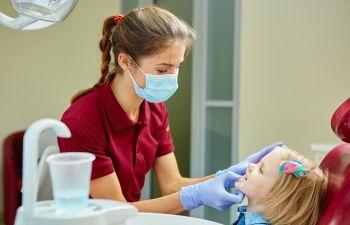1520 Green Oak Place, Suite B Kingwood, Tx 77339
Finding an Emergency Dentist: What You Need to Know

Dental emergencies are more common than you might think. Whether it is a severe toothache or a broken tooth, they can catch anyone off guard, causing pain and stress. That is why knowing how to find a dentist urgently is crucial.
This guide will explain what qualifies as a dental emergency, how to find a dentist quickly, and what to expect when you arrive. By the end, you will feel confident in managing a dental emergency efficiently.
What Qualifies as a Dental Emergency?
A dental emergency is any situation that requires immediate care to stop bleeding, relieve severe pain, or save a tooth. Some emergencies can even be life-threatening. Common emergencies include:
- Severe Toothache: A persistent, intense toothache that does not go away with pain relief.
- Knocked-out Tooth: Quick action can save a tooth when completely dislodged.
- Broken Teeth: A fractured or cracked tooth, especially if it causes pain or exposes the nerve.
- Abscessed Tooth: A serious infection around the tooth’s root that can cause swelling and pain.
When to Seek Immediate Help?
Not every dental problem requires an emergency visit. However, certain conditions need immediate attention:
- Uncontrollable Bleeding: If your mouth or gums are bleeding and it does not stop, you need help immediately.
- Severe Pain: Pain that disrupts daily activities or sleep calls for immediate care.
- Swelling or Infection: If you have significant swelling, particularly around your face or jaw, it could indicate a dangerous infection.
Other issues, like a chipped tooth without pain, might not need urgent care and can wait for a regular dental appointment.
Common Emergencies
Some of the most frequent dental emergencies include:
- Toothache: Intense, throbbing pain that does not improve with over-the-counter painkillers.
- Knocked-Out Teeth: Quick treatment may allow the tooth to be reinserted.
- Fractured or Cracked Teeth: This requires immediate care, especially if accompanied by pain or sensitivity.
- Abscesses: This dental infection can spread to other body parts if left untreated.
- Loose Fillings or Crowns: These issues may not always hurt but can leave teeth vulnerable to damage.
Where to Look for an Emergency Dentist?
Local Dentist Offices
Your regular dentist’s office is the first place to check for emergency dental care. Many dental offices offer after-hours services or can direct you to someone who does. It is always wise to call your dentist first to see if they provide emergency care.
Many offices list this information on their website, and some dentists may have an emergency hotline or on-call service for urgent needs. Remember that dental emergencies often happen outside of regular business hours, so it is helpful to confirm if your dentist provides evening or weekend care.
Online Tools and Directories
If you are in pain and your local dentist is unavailable, online directories and tools can help. Platforms like Google Maps, Yelp, or Healthgrades allow you to search for emergency dental clinics in your area.
You can enter keywords like “emergency dentist near me” to get a list of nearby options. These tools often provide real-time reviews, hours of operation, and contact details to help you find the closest available service.
You can also use dedicated apps like Zocdoc to book emergency appointments. These apps show you available dentists who can see you the same day. They also allow you to filter by location, insurance acceptance, and appointment availability.
Dental Insurance Providers
Your dental insurance provider can also be an excellent resource for finding an emergency dentist. Most insurance websites have a directory to search for dentists in your network that offer emergency services.
If unsure, call the customer service line on your insurance card. They can quickly guide you to dentists nearby that accept your insurance and are open for emergencies.
24/7 Emergency Dental Clinics
In many urban areas, 24/7 emergency dental clinics exist specifically for these situations. These clinics operate around the clock, offering care on holidays, weekends, and evenings. If you live in or near a big city, it is wise to note the location of these clinics in advance.
Suburban or rural areas may not have 24/7 clinics, but they may still have dental practices that offer extended hours or emergency services by appointment. Check your local listings and keep their information handy.
What to Ask When Contacting an Emergency Dentist?
Availability and Hours
Before rushing to the clinic, confirm that they are open and available to see you right away. Dental emergencies often need immediate attention, so ask how soon they can accommodate you. Some offices offer priority emergency scheduling, while others may have walk-in options.
Costs and Insurance
Emergency dental care can be costly, especially if you do not have insurance. Always ask if the clinic accepts your insurance and the out-of-pocket costs. If uninsured, inquire about payment plans or financing options to avoid unexpected expenses.
Type of Care Provided
Make sure the clinic can handle your specific issue. Not all dentists perform every type of procedure, especially during off-hours. Explain your situation in detail, so they can confirm whether they can help or refer you to a specialist.
Location and Directions
When you’re in pain, the last thing you want is to get lost. Confirm the clinic’s address and ask for directions, especially if you are unfamiliar with the area. Some clinics may even offer transportation assistance or help you arrange a ride.
What to Expect During an Emergency Dental Visit?
Immediate Assessment
Once you arrive at the clinic, the first step will be a quick assessment of your situation. The dentist or their team may perform an examination and take x-rays to understand the issue. Depending on the severity of the problem, they will determine the best course of action.
Pain Relief and Treatment
Dentists prioritize relieving your pain during an emergency visit. This could involve administering painkillers, applying numbing agents, or performing procedures like draining an abscess. If the tooth is salvageable, they may begin treatment, such as re-implanting a knocked-out tooth or repairing a broken one.
Follow-up Care
After the immediate issue is treated, the dentist will likely recommend follow-up appointments. This ensures the problem is fully resolved and helps prevent future issues. Be sure to ask about aftercare instructions, medications, or any precautions you should take while recovering.
Finding a dentist for urgent care can save you time, stress, and pain when it matters most. You will be better prepared by understanding what qualifies as a dental emergency and where to seek help. Bookmark your dentist’s emergency number or find a nearby 24/7 clinic to ensure you’re ready for any situation. Preparation helps you handle dental emergencies with confidence and less stress, ensuring a smoother recovery. Contact your dentist now.






